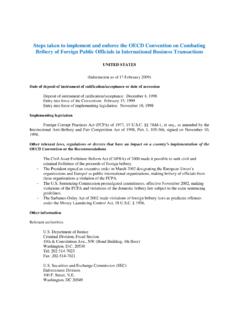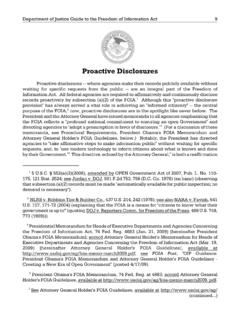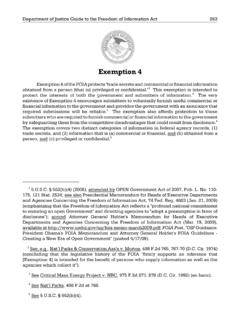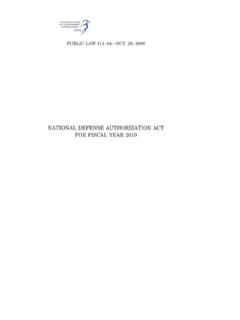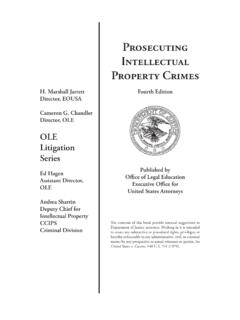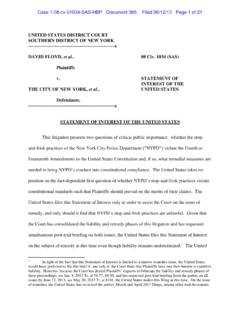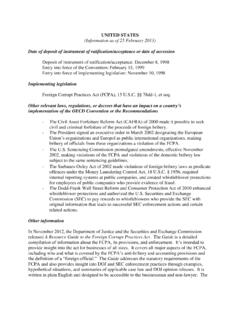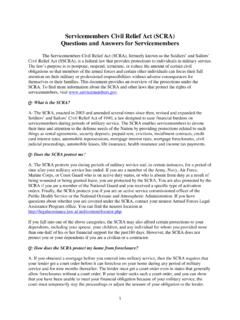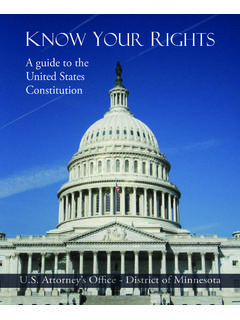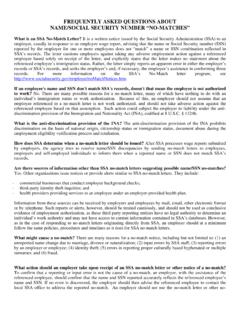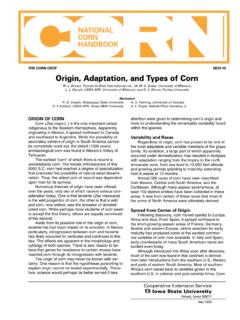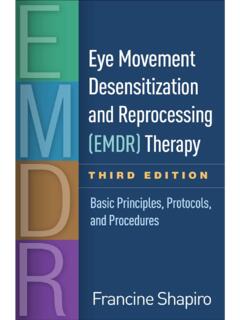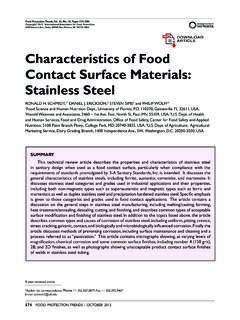Transcription of Matter of Acosta
1 Interim Decision #2986 Matter OF Acosta In Deportation Proceedings A-24159781 Decided by Board March 1, 1985 (1) Construction of the provisions the United Nations Protocol Relating to the Status of Refugees, Jan. 31, 1967, [1968] 19 6223, No. 6577, 606 268, is left by that agreement to each state that is party to the Protocol; accord -ingly, the various international interpretations of the Protocol, including the Handbook on Procedures and Criteria for Determining Refugee Status Under the 1951 Convention and the 1967 Protocol Relating to the status of Refugees pub-lished by the Office of the United Nations High Commissioner for Refugees, are useful tools in construing our obligations under the Protocol, but they are neither binding upon the United States nor controlling as to construction of the Refugee Act of 1980.
2 (2) An alien in an exclusion or deportation proceeding who seeks to demonstrate eli-gibility for either asylum under section 208 of the Immigration and Nationality Act, 8 1158 (1982), or withholding of deportation under section 243(h) of the Act, 8 1253(h) (1982), must make two related showings: he must meet his evidentiary burdens of proof and persuasion as to the facts, and he must meet the statutory standards of eligibility set out by the pertinent provisions in the Act. (3) It is the alien who bears the burdens of proof and persuasion in asylum and withholding of deportation cases and he must establish the facts by a preponder-ance of the evidence.
3 (4) In order to meet the statutory standard of eligibility for asylum, an alien must satisfy each of the following four elements in the definition of a refugee created by section 101(aX42XA) of the Act, 8 1101(aX42XA) (1982): (1) the alien must have a "fear" of "persecution"; (2) the fear must be "well founded"; (3) the persecution feared must be "on account of race, religion, nationality, membership in a particular social group, or political opinion"; and (4) the alien must be unable or unwilling to return to his country of nationality or to the country in which he last habitually resided because of persecution or his well-founded fear of persecu-tion.
4 (5) The statutory standard for asylum requires the facts to show that an alien's pri-mary motivation for requesting refuge in the United States is "fear," i e., a genu-me apprehension or awareness of danger in another country, no other motivation will suffice. (6) The term "persecution" in the definition of a refugee under the Act means harm or suffering that is inflicted upon an individual in order to punish him for pos- 211 Interim Decision #2986 sessing a belief or characteristic a persecutor seeks to overcome; the word does not encompass the harm that arises out of civil or military strife in a country. (7) The requirement of a "well-founded fear of persecution" in section 101(aX42)(A) of the Act means that an individual's fear of persecution must have its basis in external, or objective, facts that show there is a realistic likelihood he will be per-secuted upon his return to a particular country; this requires an alien to show that his fear has a solid basis in objective facts or events and that it is likely he will become the victim of persecution.
5 (8) In order for an alien to show that it is likely he will become the victim of perse-cution, his evidence must demonstrate that (1) the alien possesses a belief or char-acteristic a persecutor seeks to overcome in others by means of punishment of some sort; (2) the persecutor is already aware, or could easily become aware, that the alien possesses this belief or characteristic; (3) the persecutor has the capabil-ity of punishing the alien; and (4) the persecutor has the inclination to punish the alien. (9) The well-founded fear standard for asylum and the clear probability standard for withholding of deportation are not meaningfully different and, in practical appli-cation, converge.
6 (10) "Persecution on account of membership in a particular social group" refers to persecution that is directed toward an individual who is a member of a group of persons, all of whom share a common, immutable characteristic. , a character- istic that either is beyond the power of the individual members of the group to change or is so fundamental to their identities or consciences that it ought not be required to be changed. (11) In order for an alien tu show persecution on account of "political opinion" within the meaning of the Act, it is not sufficient to show that a persecutor's con-duct furthers his goals in a political controversy; rather, the alien must show that it is his own, individual political opinion that a persecutor seeks to overcome by the infliction of harm or suffering.
7 (12) The requirement that an alien must be unable or unwilling to return to a par-ticular country because of persecution or a well-founded fear of persecution re-quires an alien to do more than show a threat of persecution in a particular place or abode within a country he must show that the threat of persecution exists fur him country-wide. CHARGE: Order: Act of 1062 Sec. 241(aX2) [8 1251(aX2)] Entered without inspec-tion ON BEHALF OF RESPONDENT: Evangeline G Abriel, Esquire Catherine Lampard, Esquire Ecumenical Immigration Services, Inc. 821 General Pershing Street New Orleans, Louisiana 70115 ON BEHALF OF SERVICE: William M. Darlington District Counsel BY: Milhollan, Chairman; Maniatis, Dunne, Morris, and Vacca, Board Members In a decision dated December 22, 1983, the immigration judge found the respondent deportable pursuant to section 241(a)(2) of the 212 Interim Decision #2986 Immigration and Nationality Act, 8 1251(a)(2) (1982), for entering the United States without inspection, denied the respond-ent's applications for a grant of asylum and for withholding of de-portation to El Salvador, but granted the respondent the privilege of departing voluntarily in lieu of deportation.
8 The respondent has appealed from that portion of the immigration judge's decision de-nying the applications for asylum and withholding of deportation. The appeal will be dismissed. The respondent is a 36-year-old male native and citizen of El Sal-vador. In a deportation hearing held before an immigration judge over the course of 2 days in July and August 1983, the respondent conceded his deportability for entering the United States without inspection and accordingly was found deportable as charged. The respondent sought relief from deportation by applying for a discre-tionary grant of asylum pursuant to section 208 of the Act, 8 1158 (1982), and for mandatory withholding of deportation to El Salvador pursuant to section 243(h) of the Act, 8 1253(h) (1982).
9 1 In an oral decision, the immigration judge denied the re-spondent's applications for these two forms of relief finding that he had failed to meet his burden of proof for such relief. It is this find-ing that the respondent has challenged on appeal. In order to be eligible for withholding of deportation to any coun-try, an alien must show that his "life or freedom would be threat-ened in such country on account of race, religion, nationality, mem-bership in a particular social group, or political opinion." Section 243(hX1) of the Act. We have held, and the Supreme Court of the United States has recently affirmed, that this statutory provision requires an alien to demonstrate "a clear probability" of persecu-tion, on account of one of the five grounds enumerated in the Act.
10 INS v. Stevie, 467 407 (1984). The Court has construed the clear probability standard to require a showing that it is more likely than not an alien would be subject to persecution. Id. at 424. In order to be eligible for a grant of asylum, an alien must show he or she is a "refugee" as defined by section 101(a)(42)(A) of the Act, 8 1101(a)(42)(A) (1982). See section 208 of the Act. That definition includes the requirement that an alien must have "a well-founded fear of persecution on account of race, religion, na-tionality, membership in a particular social group, or political opin-ion." See section 101(a)(42)(A) of the Act. In INS v. Steviq supra, Under the regulations of the Immigration and Naturalization Service, any asylum request made after the institution of deportation proceedings is also consid-ered to be a request for withholding of deportation under section 243(h) of the Act.
